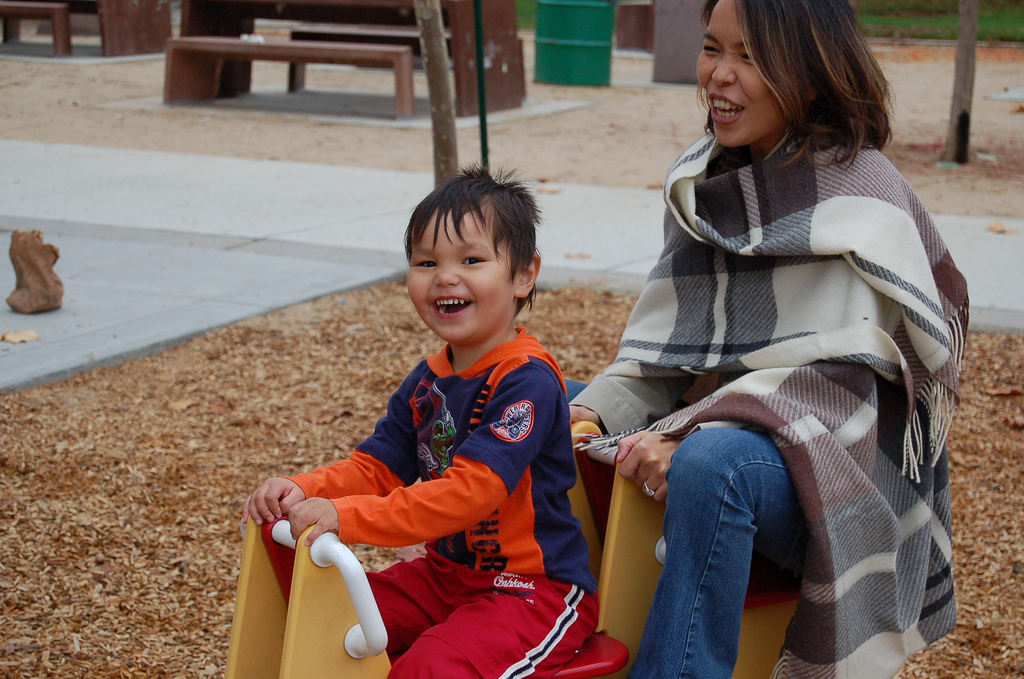>> I vividly remember advice a friend gave me when I was a new mom: never wave goodbye to your child with your car keys in your hand.
I vividly remember advice a friend gave me when I was a new mom: never wave goodbye to your child with your car keys in your hand.
I wasn’t 100% successful, but it did seem like a simple way to give my son the (false) impression that I wasn’t in a rush and that I was thinking about him and not work when I dropped him off at daycare.
A new >>study by the Pew Research Center confirms that things have not gotten any easier for working parents — especially working moms — in the 20+ years since I first heard that advice.
Roughly half of parents — both moms and dads — say it’s difficult to juggle family and career. And 20% of working moms say it’s not just difficult, but “very difficult.” (This study looked only at heterosexual, two-parent households.)
One group that seems to find balance easier is mothers who work part-time. Surprisingly, in some ways part-time working moms are even happier than moms who stay at home.
- Part-time working moms are half as likely as those who work full-time to say it’s “very difficult” to balance work and family (11% vs 20%).
- Part-timers are more likely to say they spend the “right amount” of time with their kids (77%) than either full time workers (58%) or moms who don’t work outside the home (72%).
- Part-time working and unemployed moms are less likely to say they are “always rushed” than full-time working moms (29% vs. 40%).
- Part-time workers are more satisfied with the amount of time they spend with their partners (73%) than either full-time workers (56%) or those who don’t work outside the home (66%)
Parents of color also seem to find it a little easier. Almost 60% of white dads say work/family balance is difficult, compared with 44% of fathers of color. And for mothers who work, two-thirds of white moms and about half of moms of color say it’s difficult.
The difference between black and white working mothers may be, as >>Ylonda Gault Caviness writes, that “most black women in America come from a long line of mothers who worked outside the home, and have long been accustomed to navigating work and family.”
There are a million articles on how to achieve “balance.” These articles tell you to set goals. Cut your hair short so your morning routine is easier. Wake up earlier. Have a date night once a week. Put your workout on your calendar. Pay someone to run your errands. RELAX!
In my view, all the focus on “balance” just sets us up for one more unachievable goal, along with a clean house, perfect body, rewarding career, well-adjusted kids. It just adds to the frustration and “I can’t get it all done” feeling so many of us have. As one friend told me recently, “balance” is fleeting at best. She no longer thinks about work/life balance – she thinks in terms of work/life trade-offs. “I try to be clear with myself about what I’m getting or giving if I chose work over family or vice versa.”
More importantly, by focusing on what we can do individually to achieve balance, we overlook the wider issues. One author, >>Stephen Marche , says it’s not about family vs. career, it’s about “family against money.”
It’s no surprise that families with two full-time working parents do better financially. If we really want to help parents and families thrive, we need paid parental leave; affordable, high quality day care; a living wage; and affordable health care.

I feel like I have tried about all the combinations: worked full-time, worked part-time, and stayed home (although I worked very part-time from home then), and single full-time working mom. I agree with the article. For me working part-time was the best balance that I found and more importantly what worked best for our family.